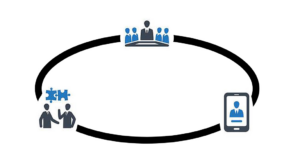“A few years ago I put it like this for myself – it will probably sound harsh – the opinion of people does not raise my interest. The reason is that the meaning of the word ‘opinion’ is not very rich. Maybe there is no knowledge, depth or truth in it. (…) nowadays everyone has an opinion. Lots of people want to express or share there opinion in one form or another. To my experience, it only adds to the cacophony and shallowness in the world. I don’t feel that these opinions would be of too much value. If someone tells me their opinion about say, happiness, I don’t get excited. However, I would be interested to hear when and what made her happy. I am also intrigued to learn what she is doing to become happy, and how she can get through the failures while seeking happiness. All of these I’m interested in. The world of opinions is too shallow for me, and shallow things I find boring.”
Building on these thoughts I have collected what seems a lot more useful to share with others or listen to, especially in work context:
- observations
- specific experiences
- personal reflections on experience
- data
- description of a situation/problem
- analysis
- deliberations
- feelings
- possible scenarios/options
- solutions proposed
- ideas
- questions
- requests
- summarising what was understood
- highlighting key points, etc.







